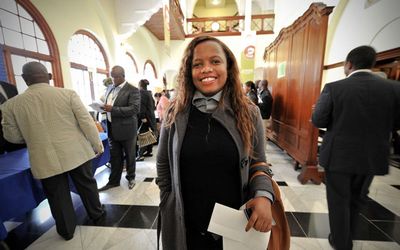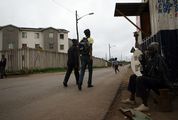LAST FRIDAY evening DA national spokeswoman Phumzile van Damme took to Twitter to express her outrage at what she claimed was racism towards her by an unnamed Durban restaurant.
"I call to book a table at a restaurant — fully booked. My white friend calls five minutes later — table available. Coincidence? I think not," she tweeted.
That was followed by: "I will not boycott. I am entitled to go anywhere I like & go I will. Let’s just say the restaurant will hear from me tonight."
And, soon afterwards: "My sister called five minutes later & it was suddenly fully booked again. Racism exists because we allow it room to thrive. Nah, son."
All three tweets were well retweeted, the first one in particular, and the combination attracted some media interest. As a result, she received online requests from journalists for the restaurant’s name.
"No, I don’t want them to know I am coming. I want to confront & hear what they have to say for themselves first," she replied to one request.
Soon afterwards, TimesLive ran the story, "‘Racist’ restaurant tells DA’s Van Damme it’s fully booked — but gives white friend table" (‘Racist’ restaurant tells DA’s Van Damme it’s fully booked – but gives white friend table). In the story Van Damme reiterated her side and introduced a new claim — that the restaurant is "known for having a quota rule" that allows only a certain number of black patrons a day.
The Sowetan website later syndicated the same story(‘Racist’ restaurant tells DA’s Van Damme it’s fully booked – but gives white friend table).
Her tweets were picked up elsewhere, too. News24 published, "DA MP tackles ‘racist’ restaurant on Twitter" (DA MP tackles 'racist' restaurant on Twitter), and the Citizen ran, "DA’s Phumzile van Damme ‘too black’ to book a table" (DA’s Phumzile van Damme ‘too black’ to book a table).
Initially Van Damme was certain the incident was racist. In a subsequent altercation with one follower, she said, "Screw you man, I experience racism and you try & make it seem like it’s my fault".
She also displayed her determination to confront the restaurant: "I’ll go where I want, when I want. Literally no one can tell me where I can’t go because of my skin colour." She put much emphasis on how she refused to be intimidated, tweeting, "They can’t dictate to me."
But, in an about-turn an hour or so later, she tweeted: "Before naming, I decided to make sure before I open myself up to be sued, called them again on my way there. They gave me a table."
This was accompanied by emoticons of crying and sceptical faces, suggesting she was both disappointed and disbelieving.
She said afterwards, "Thing is, because I’m a public rep I need to be 100% sure otherwise I will be sued. Still very pissed off though."
Van Damme’s initial tweet about her call to the restaurant was retweeted more than 70 times. She has slightly more than 20k followers on Twitter. The TimesLive story was retweeted by its main account (668k followers) and was widely shared on Facebook. By Saturday evening, the story was the most read on the TimesLive website. But neither it, nor the subsequent stories tweeted by the Citizen (22k followers) or MyNews24 (100k followers) carried her later tweet explaining that she had, in fact, been given a table.
The saga constitutes an irresponsible, shabby bit of ego-driven virtue signalling by Van Damme. It damages public debate on race and race relations.
Those online stories and tweets will have been read by thousands of people; they have inevitably created the impression there’s a restaurant in Durban that, because of a racist policy, denied Van Damme a table. One needs to read no further than the TimesLive headline. But, by Van Damme’s own admission, the very thing she was accusing them of no longer held true about thirty minutes later.
Van Damme’s first tweet was perhaps most revealing. "Coincidence?" she asked, before answering her own question: "I think not."
But why not? Coincidence is a perfectly plausible explanation. The restaurant was full when she called, but subsequently when her white friend tried it had an opening and the table was offered, so when her sister called later the restaurant was once again fully booked.
Coincidence, however, is often dismissed as implausible in the face of a large ego. The question she clearly asked herself was, "How could I, Phumzile van Damme, the DA’s national spokesperson, be denied a table?" From there only one explanation would suffice. And she took to Twitter to share it, as one does, because that is the best place to deal calmly and maturely with half-baked assumption.
If her story is to be believed, it is also a curious approach to racism on the part of the restaurant: to have a quota of black patrons. If true, it is racist to be sure, only it would seem to work against their prejudice, not in favour of it.
Likewise, if Van Damme believes it to be "known" the restaurant in question has a bigoted quota system why not provide the name regardless of the experience she described on Twitter? She suggests it is a well-established truth, on record to a newspaper, and therefore there must be much supplementary proof. Unless that too, much like her initial theory, cannot be proved? Presumably she still believes it to be true, so, let’s have the name. In fact, if she stands by anything she said, she is obliged to produce it.
If she does not, there is one thing missing from her tweets: an apology. In turn, the onus is on her, as well as the news agencies involved, to correct those stories they ran.
The emoticon she used to accompany her admission that she had been later offered a table is also revealing — a sad, crying face. She wanted her theory to be true. She was disappointed it was not. A normal reaction would be more of relief or satisfaction that the world was not as bad as one thought. But not for Van Damme.
The "gotcha" repertoire was born on Twitter. The accusation of a social crime is made, a target identified, evidence, real or imagined, is presented, and the baying masses descend, the smell of blood in the air. A spirit of moral triumphalism holds it all together. Soon, the evidence becomes irrelevant. There is only the triumphalism and, of course, the condemnation; feeding off each other like two vampires at each other’s necks.
But this was not so much "gotcha" as "the one that got away". Had it been racism, it would have allowed her to complete the public virtue-signalling mission she was on. She could have confronted the restaurant, no doubt with accompanying real-time commentary on Twitter, augmenting the role she had fashioned for herself as a brave, antiracism warrior. It was, for her, a personal loss. How sad.
Nevertheless, as things stand there is an event that played itself out only in her head, but which is now documented on numerous media platforms as fact. Without the name of the restaurant or evidence in support of her claims, this constitutes nothing more than a theory.
For the sake of argument, we could give Van Damme the benefit of the doubt. Many did. In fact, so volatile is the South African racial cauldron that she was even abused for not taking it further; one accused her of abandoning her pursuit after stand-down orders from her superiors. But, even if we do, is this really the best way for a high-profile public figure to pursue a problem like this? With much influence but little more than circumstantial evidence, in a highly sensitive atmosphere defined by instant "news" sensation?
If it were true, she would have needed definitive evidence that ruled out the possibility of coincidence and supporting evidence for her claim that it is "known" the restaurant has a racial quota system. SA’s volatile racial environment only reinforces the need for this kind of responsibility and circumspection. From there, with proof, by all means, go public.
It is sad to see a high profile DA public representative get so swept up in South African racial demagoguery. The party positions itself as the custodian of reason and perspective. When its own members are falsely accused of racism, it is at pains to point out the flaws in leaps of logic and danger of assigning motive to ambiguity. But when there was a chance to ride the wave, Van Damme was almost instantaneously on her board. It was careless and immature.
At the same time, you can be sure electioneering played a part in all this, it represented in part an opportunity to drive the narrative that the DA is opposed to racism.
Van Damme might well argue she never revealed the restaurant name and so reduced any meaningful damage. There is truth to that, but, in so far as stoking the flames of racial distrust goes, she pretty much threw petrol on that particular fire. And it’s the very fire the DA is so desperately trying to help bring under control by steering well clear of and discouraging this kind of behaviour.
Ultimately, the test is a simple one of Van Damme’s own devising: She claims to have knowledge of a Durban restaurant that is "known" for racist practices. She is on record saying so. She spent much time on Friday making clear how brave she was in the face of racism. She wanted to confront them. She would go where she wanted. She would not be dictated to. Thus, she has set her own standard. Either she provides the name and proof, or this will all be written off as in exercise in political expediency and the only real evidence on display, ironically, will be little more than her own irresponsibility.

Democratic Alliance national spokesperson Phumzile van Damme. Picture: GALLO IMAGES
LAST FRIDAY evening DA national spokeswoman Phumzile van Damme took to Twitter to express her outrage at what she claimed was racism towards her by an unnamed Durban restaurant.
"I call to book a table at a restaurant — fully booked. My white friend calls five minutes later — table available. Coincidence? I think not," she tweeted.
That was followed by: "I will not boycott. I am entitled to go anywhere I like & go I will. Let’s just say the restaurant will hear from me tonight."
And, soon afterwards: "My sister called five minutes later & it was suddenly fully booked again. Racism exists because we allow it room to thrive. Nah, son."
All three tweets were well retweeted, the first one in particular, and the combination attracted some media interest. As a result, she received online requests from journalists for the restaurant’s name.
"No, I don’t want them to know I am coming. I want to confront & hear what they have to say for themselves first," she replied to one request.
Soon afterwards, TimesLive ran the story, "‘Racist’ restaurant tells DA’s Van Damme it’s fully booked — but gives white friend table" (‘Racist’ restaurant tells DA’s Van Damme it’s fully booked – but gives white friend table). In the story Van Damme reiterated her side and introduced a new claim — that the restaurant is "known for having a quota rule" that allows only a certain number of black patrons a day.
The Sowetan website later syndicated the same story(‘Racist’ restaurant tells DA’s Van Damme it’s fully booked – but gives white friend table).
Her tweets were picked up elsewhere, too. News24 published, "DA MP tackles ‘racist’ restaurant on Twitter" (DA MP tackles 'racist' restaurant on Twitter), and the Citizen ran, "DA’s Phumzile van Damme ‘too black’ to book a table" (DA’s Phumzile van Damme ‘too black’ to book a table).
Initially Van Damme was certain the incident was racist. In a subsequent altercation with one follower, she said, "Screw you man, I experience racism and you try & make it seem like it’s my fault".
She also displayed her determination to confront the restaurant: "I’ll go where I want, when I want. Literally no one can tell me where I can’t go because of my skin colour." She put much emphasis on how she refused to be intimidated, tweeting, "They can’t dictate to me."
But, in an about-turn an hour or so later, she tweeted: "Before naming, I decided to make sure before I open myself up to be sued, called them again on my way there. They gave me a table."
This was accompanied by emoticons of crying and sceptical faces, suggesting she was both disappointed and disbelieving.
She said afterwards, "Thing is, because I’m a public rep I need to be 100% sure otherwise I will be sued. Still very pissed off though."
Van Damme’s initial tweet about her call to the restaurant was retweeted more than 70 times. She has slightly more than 20k followers on Twitter. The TimesLive story was retweeted by its main account (668k followers) and was widely shared on Facebook. By Saturday evening, the story was the most read on the TimesLive website. But neither it, nor the subsequent stories tweeted by the Citizen (22k followers) or MyNews24 (100k followers) carried her later tweet explaining that she had, in fact, been given a table.
The saga constitutes an irresponsible, shabby bit of ego-driven virtue signalling by Van Damme. It damages public debate on race and race relations.
Those online stories and tweets will have been read by thousands of people; they have inevitably created the impression there’s a restaurant in Durban that, because of a racist policy, denied Van Damme a table. One needs to read no further than the TimesLive headline. But, by Van Damme’s own admission, the very thing she was accusing them of no longer held true about thirty minutes later.
Van Damme’s first tweet was perhaps most revealing. "Coincidence?" she asked, before answering her own question: "I think not."
But why not? Coincidence is a perfectly plausible explanation. The restaurant was full when she called, but subsequently when her white friend tried it had an opening and the table was offered, so when her sister called later the restaurant was once again fully booked.
Coincidence, however, is often dismissed as implausible in the face of a large ego. The question she clearly asked herself was, "How could I, Phumzile van Damme, the DA’s national spokesperson, be denied a table?" From there only one explanation would suffice. And she took to Twitter to share it, as one does, because that is the best place to deal calmly and maturely with half-baked assumption.
If her story is to be believed, it is also a curious approach to racism on the part of the restaurant: to have a quota of black patrons. If true, it is racist to be sure, only it would seem to work against their prejudice, not in favour of it.
Likewise, if Van Damme believes it to be "known" the restaurant in question has a bigoted quota system why not provide the name regardless of the experience she described on Twitter? She suggests it is a well-established truth, on record to a newspaper, and therefore there must be much supplementary proof. Unless that too, much like her initial theory, cannot be proved? Presumably she still believes it to be true, so, let’s have the name. In fact, if she stands by anything she said, she is obliged to produce it.
If she does not, there is one thing missing from her tweets: an apology. In turn, the onus is on her, as well as the news agencies involved, to correct those stories they ran.
The emoticon she used to accompany her admission that she had been later offered a table is also revealing — a sad, crying face. She wanted her theory to be true. She was disappointed it was not. A normal reaction would be more of relief or satisfaction that the world was not as bad as one thought. But not for Van Damme.
The "gotcha" repertoire was born on Twitter. The accusation of a social crime is made, a target identified, evidence, real or imagined, is presented, and the baying masses descend, the smell of blood in the air. A spirit of moral triumphalism holds it all together. Soon, the evidence becomes irrelevant. There is only the triumphalism and, of course, the condemnation; feeding off each other like two vampires at each other’s necks.
But this was not so much "gotcha" as "the one that got away". Had it been racism, it would have allowed her to complete the public virtue-signalling mission she was on. She could have confronted the restaurant, no doubt with accompanying real-time commentary on Twitter, augmenting the role she had fashioned for herself as a brave, antiracism warrior. It was, for her, a personal loss. How sad.
Nevertheless, as things stand there is an event that played itself out only in her head, but which is now documented on numerous media platforms as fact. Without the name of the restaurant or evidence in support of her claims, this constitutes nothing more than a theory.
For the sake of argument, we could give Van Damme the benefit of the doubt. Many did. In fact, so volatile is the South African racial cauldron that she was even abused for not taking it further; one accused her of abandoning her pursuit after stand-down orders from her superiors. But, even if we do, is this really the best way for a high-profile public figure to pursue a problem like this? With much influence but little more than circumstantial evidence, in a highly sensitive atmosphere defined by instant "news" sensation?
If it were true, she would have needed definitive evidence that ruled out the possibility of coincidence and supporting evidence for her claim that it is "known" the restaurant has a racial quota system. SA’s volatile racial environment only reinforces the need for this kind of responsibility and circumspection. From there, with proof, by all means, go public.
It is sad to see a high profile DA public representative get so swept up in South African racial demagoguery. The party positions itself as the custodian of reason and perspective. When its own members are falsely accused of racism, it is at pains to point out the flaws in leaps of logic and danger of assigning motive to ambiguity. But when there was a chance to ride the wave, Van Damme was almost instantaneously on her board. It was careless and immature.
At the same time, you can be sure electioneering played a part in all this, it represented in part an opportunity to drive the narrative that the DA is opposed to racism.
Van Damme might well argue she never revealed the restaurant name and so reduced any meaningful damage. There is truth to that, but, in so far as stoking the flames of racial distrust goes, she pretty much threw petrol on that particular fire. And it’s the very fire the DA is so desperately trying to help bring under control by steering well clear of and discouraging this kind of behaviour.
Ultimately, the test is a simple one of Van Damme’s own devising: She claims to have knowledge of a Durban restaurant that is "known" for racist practices. She is on record saying so. She spent much time on Friday making clear how brave she was in the face of racism. She wanted to confront them. She would go where she wanted. She would not be dictated to. Thus, she has set her own standard. Either she provides the name and proof, or this will all be written off as in exercise in political expediency and the only real evidence on display, ironically, will be little more than her own irresponsibility.



















